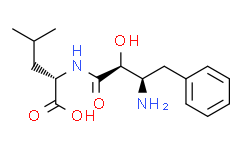体外研究:
DMSO : 8.33 mg/mL (27.01 mM; Need ultrasonic)
配制储备溶液
|
浓度
溶剂体积
质量
|
1 mg |
5 mg |
10 mg |
| 1 mM |
3.2429 mL |
16.2143 mL |
32.4286 mL |
| 5 mM |
0.6486 mL |
3.2429 mL |
6.4857 mL |
| 10 mM |
0.3243 mL |
1.6214 mL |
3.2429 mL |
*
产品不同,其溶解度不同。建议根据产品选择合适的溶剂配制储备溶液;配成溶液后,建议分装保存,避免反复冻融造成的产品失效。
储备液的保存方式和期限:-80°C, 6 months; -20°C, 1 month (sealed storage, away from moisture)。-80°C 储存时,建议在 6 个月内使用,-20°C 储存时,建议在 1 个月内使用。
体内研究:
建议根据您的实验动物和给药方式选择适当的溶解方案。以下溶解方案都建议先按照 体外研究 方式配制澄清的储备液,再依次添加助溶剂:
——为保证实验结果的可靠性,澄清的储备液可以根据储存条件,适当保存;体内实验的工作液,建议您现用现配,当天使用;
以下溶剂前显示的百
分比是指该溶剂在您配制终溶液中的体积占比;如在配制过程中出现沉淀、析出现象,可以通过加热和/或超声的方式助溶
-
1.
建议依照次序添加每种溶剂: 10% DMSO 40% PEG300 5% Tween-80 45% saline
Solubility: ≥ 0.83 mg/mL (2.69 mM); Clear solution
此方案可获得 ≥ 0.83 mg/mL (2.69 mM,饱和度未知) 的澄清溶液。
以 1 mL 工作液为例,取 100 μL 8.3 mg/mL 的澄清 DMSO 储备液加到 400 μL PEG300 中,混合均匀;向上述体系中加入50 μL Tween-80,混合均匀;然后继续加入 450 μL生理盐水定容至 1 mL。
-
2.
建议依照次序添加每种溶剂: 10% DMSO 90% (20% SBE-β-CD in saline)
Solubility: ≥ 0.83 mg/mL (2.69 mM); Clear solution
此方案可获得 ≥ 0.83 mg/mL (2.69 mM,饱和度未知) 的澄清溶液。
以 1 mL 工作液为例,取 100 μL 8.3 mg/mL 的澄清 DMSO 储备液加到 900 μL 20% 的 SBE-β-CD 生理盐水水溶液中,混合均匀。
-
3.
建议依照次序添加每种溶剂: 10% DMSO 90% corn oil
Solubility: ≥ 0.83 mg/mL (2.69 mM); Clear solution
此方案可获得 ≥ 0.83 mg/mL (2.69 mM,饱和度未知) 的澄清溶液,此方案不适用于实验周期在半个月以上的实验。
以 1 mL 工作液为例,取 100 μL 8.3 mg/mL 的澄清 DMSO 储备液加到 900 μL玉米油中,混合均匀。
*



 扫码关注公众号
扫码关注公众号